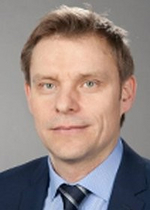Thomas Hofmann
DNA Damage Signalling in Cell Fate Control & Cancer

Dysfunction of the DNA damage response is a driving force for genome instability and cancer. Cells sense DNA damage through specific sensor complexes and elicit a DNA damage signalling network largely driven by the checkpoint kinases ATM and ATR, which are activated upon DNA double-strand breaks or replicative stress, respectively. Cells can respond to DNA damage by activating different cellular responses, such as DNA repair and inflammation, or upon irreparable DNA damage, the cellular senescence or cell death responses. The underlying mechanisms by which the DNA damage response is specified to guide these specific responses to achieve a specific cell fate-decision are still largely unclear. Cancer cells also typically harbour mutations in key DNA repair and DNA damage checkpoint regulators, which disturbs decision-making between the DNA repair, senescence and cell death responses.
Our work is aimed at elucidating the molecular signalling mechanisms driving the DNA damage-induced cell fate choice between DNA repair, inflammation, cellular senescence or cell death. We currently focus on the function and regulation of the DNA damage kinase ATM and HIPK2, the tumour suppressor p53, which is the most frequently mutated pathway in cancer, as well as on novel mutations we identified in the p53 and Fanconi anemia/BRCA pathways in the germline of children with cancer.
Our final goal is to identify novel vulnerabilities in cancer cells in order to manipulate and guide the DNA damage-induced cell fate choice towards synthetic lethality, cell death or senescence.
Positions held
- Since 2018: W3-Professor & Chair of Toxicology, Institute of Toxicology, University Medical Center (UMC), Mainz; Director, Institute of Toxicology, University Medical Center (UMC), Mainz
- 2008 - 2018: Permanent Group Leader Position, DKFZ, Heidelberg
- 2006 - 2018: Head of Research Group “Cellular Senescence”, German Cancer Research Center (DKFZ), Heidelberg
- 2004 - 2005: Research Group “Molecular Ageing Research”, German Center for Research on Ageing (DZFA), University of Heidelberg
Education
- 2016: Habilitation and venia legendi for Biochemistry & Molecular Biology , Faculty of Biology, University of Heidelberg
- 2000 - 2004: Postdoctoral research with Prof. Hans Will, Heinrich-Pette-Institut, University of Hamburg
- 2000: PhD (summa cum laude), University of Heidelberg
- 1997 - 2000: PhD studies with Prof. M.Lienhard Schmitz & Prof. Wulf Dröge, DKFZ Heidelberg
- 1997: Diploma in Biology, University of Heidelberg
- 1991 - 1997: Studies of Biology, University of Heidelberg
Selected publications by Thomas Hofmann
Sigismundo G, Arseni L, Palacio-Escat N, Hofmann TG, Seiffert M, Krijgsveld J (2023). Multi-layered chromatin proteomics identifies vulnerabilities in DNA repair. Nucleic Acids Res 51:687-711. Link
Clemm von Hohenberg K, Müller S, Schleich S, Meister M, Bohlen J, Hofmann TG, Teleman AA (2022). Cyclin B/CDK1 and Cyclin A/CDK2 phosphorylate DENR to promote mitotic protein translation and faithful cell division.Nat Commun. 13:668. Link
Liebl MC, Moehlenbrink J, Becker H, Raddatz G, Abdeen SK, Aqeilan RI, Lyko F, Hofmann TG (2021) DAZAP2 acts as specifier of the p53 response to DNA damage. Nucleic Acids Res, 49(5):2759-2776 Link
Rodríguez-Paredes M, Bormann F, Raddatz G, Gutekunst J, Lucena-Porcel C, Köhler F, Wurzer E, Schmidt K, Gallinat S, Wenck H, Röwert-Huber J, Denisova E, Feuerbach L, Park J, Brors B, Herpel E, Nindl I, Hofmann TG, Winnefeld M and Lyko F (2018) Methylation profiling identifies two subclasses of squamous cell carcinoma related to distinct cells of origin. Nat Commun, 9:577 Link
Conrad E, Polonio-Vallon T, Meister M, Matt S, Bitomsky N, Herbel C, Liebl M, Greiner V, Kriznik B, Schumacher S, Krieghoff-Henning E, and Hofmann TG (2016) HIPK2 restricts SIRT1 activity upon severe DNA damage by a phosphorylation-controlled mechanism. Cell Death Differ, 23:110-122 Link
Ucar O, Kaiyong Li, Dvornikov D, Kreuz C, Timmer J, Matt S, Brenner L, Smedley S, Travis MA, Hofmann TG, Klingmüller U and Kyewski B (2016) A thymic epithelial stem cell pool persists throughout ontogeny and is modulated by TGF-ß. Cell Rep, 17:448-457 Link
Ucar A, Ucar O, Klug P, Matt S, Brunk F, Hofmann TG* and Kyewski B* (2014). Adult thymus contains FoxN1- epithelial stem cells that are bipotent for medullary and cortical thymic epithelial lineages. Immunity, 41:257-269 (*indicates joint contribution) Link
